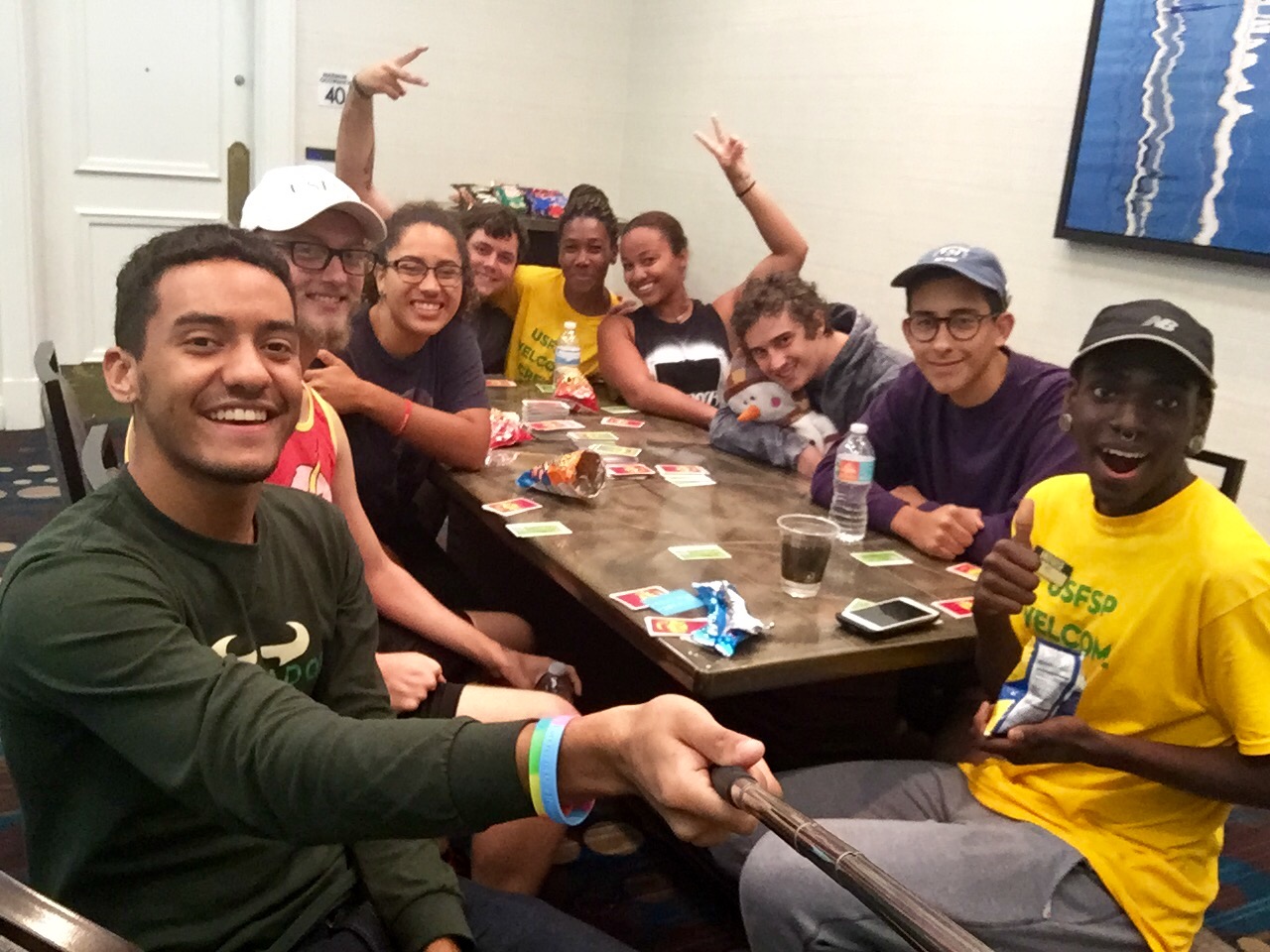The storm made landfall on Friday, with rushing winds and heavy downpours. Hermine was the first hurricane to hit Florida in 11 years. USF St. Petersburg announced it would close Thursday and Friday for the safety of students and faculty.
On campus, students collected in floor lounges, wrapped in blankets, playing movies near glass windows that pattered with torrential rain. Some played Apples to Apples and Jenga at “hurricane parties” hosted by the RA’s in the Hilton ballrooms to distract themselves, fending off boredom. These students took the storm lightly, while it coasted toward the panhandle instead of directly striking St. Petersburg.
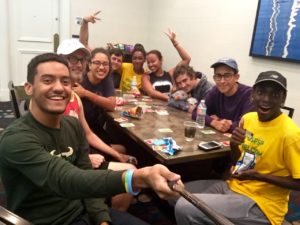
Connor Reading, a sophomore psychology major, said that the parties were “pretty dope.”
“I was perfectly fine with not having to go to class on Thursday,” Reading said. “I wasn’t worried about Hermine at all.”
For many students, the news of a day off was something to celebrate. Rachel Urbaniak is a marine biology major and she wasn’t very concerned with the hurricane either.
“I’ve always been an under-preparer,” Urbaniak said. “I think it’s going to be fine while everyone else is bunkering down.”
Urbaniak commutes to USFSP and said that she prioritizes safety over classes.
Ashlee Steinberg is a senior marine biology major and she has two main concerns: her anxious pup and her car making it through the flooded streets.
Despite the relaxed approach to dealing with the Category 1 hurricane, a different trajectory could lead to drastic changes.
Emily Tinti, a senior psychology major, lives in the Resident Hall Hilton. She prepared early for the storm.
“I charged my phone, laptop, camera and portable charger,” Tinti said. “I have plenty of water and some non-perishable snacks in my room, so I think I’m good. I also made sure to get an assignment that’s due Thursday night done [Wednesday night] just in case.”
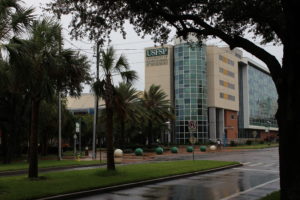
Tinti said the Hilton feels a little more secure in times of severe weather.
“Although I love the sound of rain and thunder, it’s easier to forget there’s even a storm when the hotel walls are nearly sound-proof,” she said.
Tinti had a few ideas on how housing can help prepare students for Hurricane Hermine and future storms. She did not think they should be taken lightly.
“As for residents directly on campus, I think a mass email detailing the severity of the weather and the possible issues might be comforting for some. Maybe they could hold residence hall meetings on each floor,” she said.
“I just think it’s important for people not to treat this like another thunderstorm, but understand that it can actually be unsafe to be outdoors for long.”
The USF system sent out conflicting emails Wednesday. From the St. Petersburg campus a message was sent telling students that classes would not be cancelled on both Thursday and Friday.
Later in the evening, another email was sent out to disregard that information.
The Communications and Marketing Office for the main campus alerted students that the school would close Thursday. The university decided to close on Friday as well.
Leon Hardy is a biology professor for USFSP. He expressed concern Wednesday after having to drive through the flooded roads. Hardy checked both CNN and the Tampa Bay Times for updates, and breathed a little easier after the school announcement. Hardy said that, to his knowledge, weather reports and meteorologists could be trusted sources.
“I put a lot of stock into what they have to say,” Hardy said. “The radars they have now are so much better than they used to be.”
As the storm moved through the Gulf of Mexico Wednesday, the USFSP Police Department began to prepare.
Sgt. Walter Ewing has been with the police department for nearly 24 years. He said that the last time the weather was this bad, students weren’t living on campus.
“El Niño was 10 or 11 years ago,” said Ewing. “Before El Nino we didn’t have anyone on campus, so we didn’t need to evac anyone… We did shut the campus down.”
UPD began preparations by setting up its Emergency Operations Center.
“That increases phone lines and videos of news and things of that nature,” Ewing said.
The officer advised that students get on the MoBull Messenger system to ensure that they are kept updated in these situations. MoBull is an emergency notification system that notifies students, faculty and staff by text message.
Ewing said that he was not worried about the rest of the hurricane season, but he did note that flooding posed the biggest threat.
“In the past it does not seem to have an effect one way or another. Sometimes you can have an El Niño, where it’s every two weeks and there’s another hurricane. Then there have been other hurricane seasons where it’s just one and done. It’s up to the weatherman on that one.”
Hermine upgraded to a hurricane Thursday. The storm’s outer rainbands swept over the campus day and night. Students on campus were urged to stay inside due to a tornado warning at USFSP.
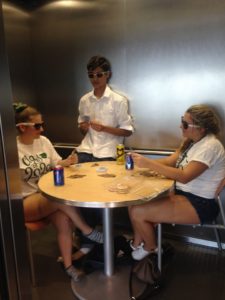
Scott Hendershot is the housing assignments and operations coordinator for residence life. He lives on campus in RHO and helped explain the safety policies for campus residents.
“In preparation for Hermine, Housing and Residence Life met with the USFSP Emergency Management team,” said Hendershot. “We created a plan of action for many different scenarios and made sure that we had all supplies necessary.”
When students sign up for housing, they are required to describe where they will go in case of an emergency evacuation. Students’ plans vary, some stay with friends, others head to a sibling’s house or back home to their parents.
Hendershot said that the university is equipped to handle students who need a quick change of plans.
“If an evacuation was to occur, we would have Residence Life Staff meet with each student to find out what the residents’ plan was for that particular case, as it may have changed from what they originally thought. We also have made arrangements for students to be put in a shelter if they are not able to secure shelter of their own in case of an evacuation,” said Hendershot.
Hendershot recommended that students read the Hurricane and Threatening Weather document on the USFSP Housing Homepage. This information warns that USFSP is not liable for any loss or damage to personal property. It also informs students that, “in circumstances where an evacuation may be necessary, shelter facilities or transportation to shelter facilities are not provided by the University.”
Stephanie Eide is a junior from Wisconsin. She is a resident of RHO. Eide wrote on her housing contract that she would return to Wisconsin if she needed to evacuate. Returning to Wisconsin during a hurricane would be highly implausible. Eide instead told The Crow’s Nest in an interview that her plan would be to leave with her friend Alex Dibello to her house in St. Petersburg.
Hermine would be Eide’s first experience with a hurricane. Fortunately, she didn’t seem to concerned about the storm.
“I mean, it just seems like a lot of rain,” Eide said.
It was a lot of rain. St. Petersburg was not hit as hard as it could have been, but there was no shortage of effects on the city.
The Sunshine Skyway Bridge was closed in the early afternoon on Thursday, the same day it was announced that Hermine had been upgraded to a Category 1 hurricane. It was not opened again until Friday at 3:45 p.m.
The first Florida hurricane since Wilma in 2005, Hermine made landfall on Friday near St. Mark’s. Later that day it weakened to a tropical storm near Valdosta, Georgia.
While Pinellas County did not have to endure any major evacuations, Pasco, a neighboring county, had one of their hospitals lose power. Bayonet Regional Medical Center lost power due to a lightning strike and had to transfer 209 patients to other facilities. Pinellas County made sure it had enough staff to continue at full operation and then was able to send 50 people to help with the transfers. This task was accomplished with the aid of ambu-buses, five paramedic engines and 16 ambulances.
Charlie Justice, chairman of the Pinellas County Board of County Commissioners was happy that the counties were able to work together.
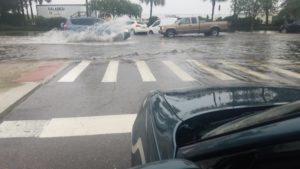
“This well-coordinated effort shows the strength of our local EMS system to maintain critical emergency services for our residents while lending a helping hand across county lines,” Justice said. “Our success is a direct result of long-standing partnerships between our county’s many local agencies.”
Several streets were closed off due to flooding and debris, including parts of Gulf Blvd, Martin Luther King St. and all of Shore Acres.
Hurricane Hermine has now come and gone, but the hurricane season continues through Nov. 30. Florida is a prime location for another big storm and it’s essential to be prepared.
These are a few items that should be kept in your home, whether that be a dorm or house.
One should constantly have items like bottled water and non-perishable foods, such as canned fruits and vegetables, peanut butter and jelly.
For the water it is recommended that you have one gallon of water per person per day for at least three days. Also if you have a pet make sure you have food and water for them stocked up as well.
Electronics, you should make sure to have flashlights and extra batteries and portable chargers for cellphones. Candles are also good to have around, but if you live in a dorm stick with the flashlights.
Hygiene is a pretty important factor so make sure to have toilet paper and hand sanitizer too. To handle being outside after the hurricane sunscreen and mosquito repellant is another major key. First Aid Kits are also critical incase of any emergency.
[huge_it_slider id=”2″]

